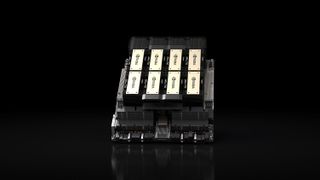Underground network smuggles Nvidia's AI GPUs into China despite US sanctions — some smugglers even sell entire servers
WSJ reveals a persistent and adaptive supply chain for Nvidia GPUs to China.

Despite U.S. restrictions aimed to limit access of China-based entities to advanced AI and HPC processors, a network of buyers, sellers, and couriers is bypassing the U.S. export controls on Nvidia's processors crucial for training AI systems. Over 70 distributors openly advertise these chips online, with many promising delivery in weeks and some even selling entire servers, reports the Wall Street Journal.
Last fall, a 26-year-old Chinese student smuggled Nvidia AI processors from Singapore to China. The student packed six Nvidia compute cards (or modules) alongside his personal belongings. Each add-in-board, about the size of a Nintendo Switch, somehow went unnoticed at the airport. He declared the value at $100 per card, a small fraction of their underground market value, and yet it didn't raise any suspicion neither in Singapore (which is not interested in smuggling advanced technology to China) nor in China (which is interested in getting advanced technology but is also interested in getting import duties).
The WSJ claims that the student's activity is part of a broader, loosely concealed operation to evade restrictions imposed by the U.S. government. Nvidia's AI processors are in high demand as the company's CUDA framework is particularly popular in China's AI space, both among academia and commercial developers. As a result, over 70 distributors advertise these restricted processors online, with many verified sellers claiming to have dozens available each month. These sellers address both startups and research institutions with relatively limited needs, offering preorders and promising deliveries within weeks. Some of them even offer servers with eight Nvidia processors inside for $300,000, the report claims.
Chinese sellers typically charge a premium for these chips, but prices have recently decreased due to increased supply and less panic buying. While the exact size of this underground market remains unknown, it is considered relatively small compared to the overall market.
The WSJ reports that a broker in Singapore, Brother Jiang, facilitates smuggling by leveraging contacts in distribution channels and system integrators in Southeast Asia. He helps Chinese customers obtain advanced AI processors and servers, arranging logistics and customs paperwork. Jiang's network avoids large orders to remain inconspicuous, providing a steady, albeit limited, supply of Nvidia's high-end processors.
The smuggled chips, particularly the A100 and H100 models, are sold at high prices in China. Officially, Nvidia does not sell these chips to China due to export restrictions. However, Chinese research institutes and universities continue to acquire them through unofficial channels. The underground market has adapted to meet ongoing demand, even as official supplies are restricted.
Nvidia's AI GPUs are nearly impossible to refurbish or 'replicate' accurately, so we are indeed dealing with a smuggling network that distributes legit processors. The Wall Street Journal verified the existence of this underground market through Chinese buyers, transaction records, customs filings, and photos of the processes. The U.S. Commerce Department, responsible for enforcing export restrictions, did not comment.
Stay On the Cutting Edge: Get the Tom's Hardware Newsletter
Get Tom's Hardware's best news and in-depth reviews, straight to your inbox.
Nvidia sells its data center processors to third parties like Dell, HPE, and Supermicro, which then assemble and sell AI servers. These companies sometimes order more processors than needed and sell the excess to unofficial channels. All companies claim to comply with U.S. export controls and act against illicit activities if discovered, but some things are beyond their control, as they sometimes sell to various smaller value-added resellers.
Chinese tech companies are actively trying to develop their own high-end AI chips, but they face significant challenges. Until China can produce comparable AI chips domestically, the black market for Nvidia's advanced products will likely continue. The student who smuggled the chips expressed willingness to continue smuggling, motivated by both financial gain and a sense of national contribution, which means that there is a persistent and adaptive illicit supply chain circumventing U.S. export rules.

Anton Shilov is a contributing writer at Tom’s Hardware. Over the past couple of decades, he has covered everything from CPUs and GPUs to supercomputers and from modern process technologies and latest fab tools to high-tech industry trends.
-
hotaru251 and again: sanctions do not 100% stop someone from getting something it just makes it harder and less legal. If someone wants something..they'll get it.Reply
Most Popular





